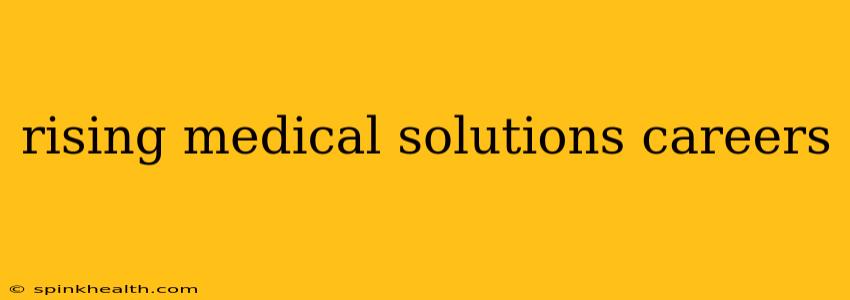The healthcare industry is in constant flux, driven by technological advancements, an aging population, and evolving patient needs. This dynamic landscape creates a surge in demand for professionals in various medical solutions careers. It's no longer just about doctors and nurses; a whole ecosystem of specialists is needed to deliver innovative and effective healthcare. This article explores some of the fastest-growing and most promising medical solutions careers, offering a glimpse into the future of this vital sector.
What are some of the most in-demand medical jobs for the future?
This question encapsulates the core of our exploration. The future of healthcare isn't just about treating illnesses; it's about preventing them, managing chronic conditions effectively, and personalizing care to the individual. This shift necessitates a diverse range of skills and expertise. Some of the most in-demand jobs include roles focusing on data analysis, technological integration, and patient-centric care models. We'll delve into specifics shortly.
What medical jobs are in high demand?
High demand translates to excellent job prospects and competitive salaries. Let's explore a few areas experiencing significant growth:
1. Data Scientists and Analysts in Healthcare:
The sheer volume of health data generated daily—from electronic health records to wearable sensor data—is staggering. Healthcare data scientists are crucial in interpreting this information, identifying trends, predicting outbreaks, and personalizing treatment plans. Their work is vital in improving patient outcomes and optimizing healthcare resource allocation. Imagine, for instance, a data scientist identifying a previously unknown risk factor for a specific disease through analyzing patient data, allowing for early intervention and prevention strategies. This is the power of data-driven healthcare.
2. Medical Informatics Specialists:
These professionals bridge the gap between technology and healthcare. They design, implement, and maintain electronic health record systems, ensuring data security and interoperability. As healthcare becomes increasingly digitized, the demand for skilled medical informatics specialists will only continue to rise. Think of them as the architects of the digital healthcare infrastructure, ensuring seamless data flow and information accessibility.
3. Bioinformatics Specialists:
At the forefront of genomic research and personalized medicine, bioinformatics specialists analyze biological data using computational tools. They help unravel the complexities of DNA, RNA, and proteins, leading to breakthroughs in disease diagnosis, treatment, and prevention. Their work is essential in developing targeted therapies and personalized medicine approaches, making healthcare more effective and precise.
4. Telehealth Professionals:
The rise of telehealth has revolutionized healthcare access, particularly for patients in remote areas or with mobility challenges. Telehealth professionals, including nurses, physicians, and technicians, provide remote consultations, monitoring, and support, extending the reach of healthcare services. This career path is particularly promising, offering flexibility and a significant impact on patient care.
5. Medical Device Technicians:
With the constant advancement of medical technology, the need for skilled technicians to maintain, repair, and calibrate medical devices is growing rapidly. These professionals ensure the smooth operation of crucial equipment in hospitals and clinics, playing a vital role in the safety and efficiency of healthcare delivery.
What are the highest paying medical jobs?
While salary varies by experience, location, and employer, several medical solutions careers consistently rank among the highest paying. Specialties requiring extensive education and training, such as surgery, cardiology, and oncology, often command top salaries. However, the roles outlined above—data scientists, medical informatics specialists, and bioinformatics specialists—are also increasingly attracting high salaries due to the growing demand for their unique skill sets.
What are the best medical jobs for the future?
The "best" medical job is highly subjective, depending on individual interests, skills, and career goals. However, careers focusing on technology, data analysis, and patient-centered care offer exceptional growth potential and the opportunity to make a significant impact on the healthcare industry. The roles highlighted above represent some of the most promising avenues for future success in the field of medical solutions.
The future of healthcare is undeniably intertwined with technological innovation and data-driven insights. The careers discussed here represent just a fraction of the exciting opportunities emerging in this dynamic and crucial sector. The individuals who embrace these evolving roles will not only find rewarding careers but will also play a vital role in shaping the future of healthcare for generations to come.

